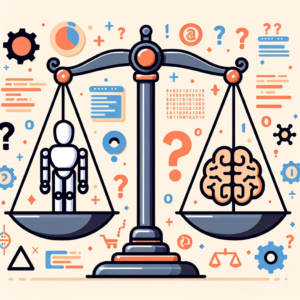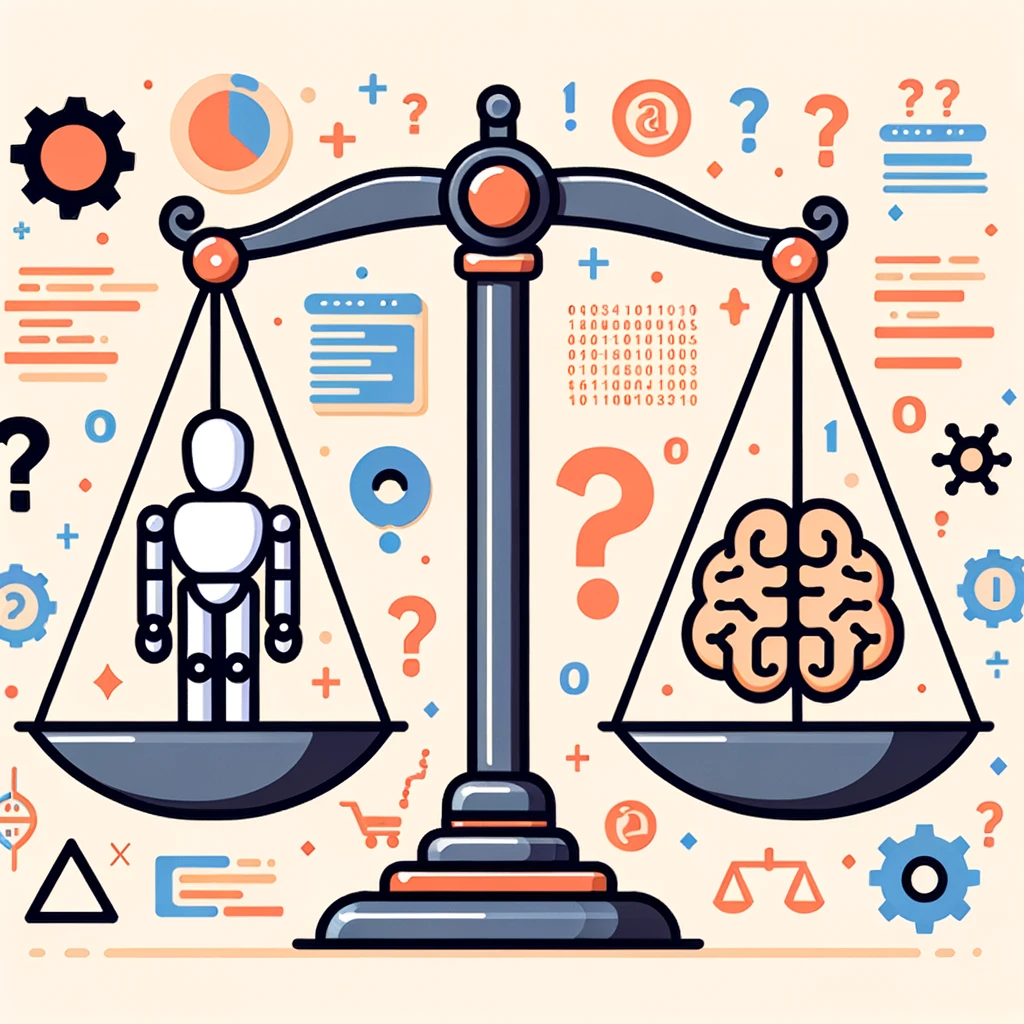In the ever-evolving realm of artificial intelligence (AI), questions surrounding ethics and accountability have become increasingly pertinent. As AI becomes more sophisticated and integrated into various aspects of our lives, it is essential to explore how ethical considerations factor into the decision-making processes of AI systems, and ultimately, who should shoulder the responsibility for the consequences of their actions. This article delves into the complex world of AI ethics, shedding light on the critical issues at hand and the challenges we face as AI continues to shape our present and future.

Understanding Artificial Intelligence
Artificial Intelligence (AI) refers to the development of machines that can perform tasks that traditionally require human intelligence. This branch of computer science aims to create intelligent machines capable of learning, reasoning, and problem-solving. AI has gained significant prominence in recent years, revolutionizing various industries and enhancing efficiency in numerous processes.
Definition of AI
At its core, AI encompasses the design and development of intelligent systems that demonstrate traits such as perception, reasoning, learning, and problem-solving. These systems rely on advanced algorithms and technology to simulate human-like intelligence and make decisions. While the concept of AI has been around for decades, recent advancements in computing power and data collection have propelled its rapid growth and innovative applications across various domains.
Different types of AI
There are several types of AI, each designed to tackle different tasks and operate at varying levels of complexity. The primary classifications of AI include:
- Narrow AI: Also known as weak or narrow AI, this form of AI is designed to perform specific tasks, often surpassing human capabilities. Examples include voice assistants like Siri and Alexa or image recognition systems used in facial recognition technology.
- General AI: General AI refers to an AI system that possesses the ability to understand, learn, and perform any intellectual task that a human being can. General AI represents the pinnacle of AI development, where machines can exhibit human-like consciousness and reasoning.
Use of AI in various industries
AI has found applications across numerous industries, revolutionizing the way tasks are performed and decisions are made. Some notable sectors benefiting from AI include:
- Healthcare: AI is transforming healthcare through disease diagnosis, drug development, and personalized treatment plans. Machine learning algorithms enable early detection of diseases and assist healthcare professionals in making accurate diagnoses.
- Finance: In the finance industry, AI has enhanced fraud detection, risk assessment, and automated trading strategies. AI-powered chatbots are also used to provide personalized financial advice to customers.
- Transportation: Self-driving cars and intelligent traffic management systems are prime examples of how AI is revolutionizing transportation. These technologies aim to improve road safety, reduce congestion, and optimize transportation networks.
- Manufacturing: AI-enabled robots and automation technologies have streamlined production processes, improving efficiency and reducing errors. Predictive maintenance using AI helps prevent equipment failures and optimize productivity.
- Customer Service: AI-based chatbots and virtual assistants have transformed customer service by providing 24/7 support, addressing customer queries, and offering personalized recommendations.
The versatile applications of AI demonstrate its potential to improve efficiency, enhance decision-making, and reshape industries across the board. However, as AI becomes increasingly integrated into our daily lives, it is crucial to consider the ethical implications surrounding its development and use.
Importance of Ethics in Artificial Intelligence
Ethics plays a vital role in ensuring the responsible development and use of AI systems. As AI continues to advance, the potential for unintended consequences and societal impact increases. Ethical guidelines act as a moral compass, providing a framework for ethical decision-making and protecting the rights and well-being of individuals and societies.
Value of ethical guidelines in AI
Adhering to ethical guidelines in AI development and deployment helps prevent potential harm, safeguard privacy and security, and promote fairness and transparency. Well-defined ethical principles and guidelines ensure AI systems are designed and used in a manner that respects basic human values and doesn’t violate ethical standards.
Ethical guidelines also address biases that may be present in AI systems, ensuring fair treatment and non-discrimination. By incorporating ethical considerations, developers can foster public trust and avoid the negative consequences of AI misuse.
Potential threats without ethics in AI
Without a strong ethical framework, AI systems risk a range of potential threats. Biased decision-making, privacy breaches, and discriminatory practices are among the concerns associated with unethical AI. Lack of accountability and transparency can lead to a loss of public trust, hindering widespread adoption and acceptance of AI technologies.
Moreover, the potential for AI systems to be manipulated or hijacked for malicious purposes raises significant security and ethical concerns. To mitigate these threats, it is imperative to integrate ethics into AI decision-making processes.
Application of Ethics in AI Decisions
Embedding ethics in AI decision-making ensures that machines align with societal values and behave in an ethical manner. This involves considering ethical principles and values during the design, development, and operation of AI systems.
Practical examples of ethics in AI decisions
Ethical considerations in AI decisions can be demonstrated through real-world examples:
- Autonomous Vehicles: Ethical decision-making is necessary when programming self-driving cars to navigate potential ethical dilemmas, such as determining the course of action in unavoidable accidents. For instance, should the car protect its passengers at the expense of pedestrians, or vice versa? By considering societal values, like minimizing harm, AI systems can make ethical choices in critical situations.
- Content Moderation: Online platforms employ AI algorithms to moderate user-generated content. Ethical guidelines ensure that potentially harmful or inappropriate content is identified and removed while preserving free speech and avoiding unnecessary censorship. Striking the right balance requires ethical considerations to prevent biases and discrimination.
By actively integrating ethical values into the decision-making processes of AI systems, developers can promote responsible and ethical AI applications.
Challenges in Applying Ethics to AI
While incorporating ethics into AI decision-making is crucial, several challenges must be addressed to ensure its successful implementation.
Incorporating human emotions
One significant challenge involves incorporating human emotions into AI systems. Emotions play a vital role in ethical decision-making, and machines typically lack the ability to experience or understand emotions. However, researchers are exploring ways to simulate human emotions in AI systems, enabling them to make ethically informed decisions that align with human values and considerations.
Rendering AI to understand ethical dilemmas
Another challenge lies in developing AI systems that can comprehend and navigate complex ethical dilemmas. AI should be capable of understanding nuances, cultural differences, and subjective evaluations that contribute to ethical decision-making. This requires extensive research and development to enhance AI’s ability to recognize and respond appropriately to ethical dilemmas.
AI bias and discrimination
Biases within AI systems pose ethical challenges that need to be addressed. Machine learning algorithms learn from vast amounts of data, which may inadvertently contain biases from historical or societal prejudices. Biased AI systems can perpetuate or amplify existing biases, leading to unfair or discriminatory outcomes. Addressing and mitigating biases in AI models is crucial to ensure ethical decision-making and avoid harm to certain individuals or groups.
Overcoming these challenges requires collaboration between AI developers, ethicists, policymakers, and stakeholders to foster the responsible and ethical use of AI technologies.

AI Responsibility and Accountability
As AI systems become increasingly autonomous, questions arise regarding who should be held responsible for their actions. Assigning responsibility to AI involves considering both legal and moral aspects.
Ownership of AI actions
The issue of ownership of AI actions is complex. While developers are responsible for the design and functionality of AI systems, determining responsibility for individual actions becomes challenging as AI systems learn and adapt their behavior based on data and experiences. Existing legal frameworks need to be updated to address these questions, defining clear boundaries for accountability.
Transfer of responsibilities from humans to AI
As AI systems become more capable and autonomous, there is a potential shift in responsibility from humans to AI. This transfer of responsibility requires careful consideration and ensures that AI systems are held accountable for their actions. Implementing appropriate mechanisms to monitor, control, and regulate AI becomes crucial to prevent any misuse or negative consequences.
Legal Aspects of AI Responsibility
The legal framework for AI responsibility is an ongoing area of debate and development. As AI technology evolves, laws need to adapt to address the ethical implications and potential risks. Currently, legal systems are grappling with the complexities associated with AI responsibility.
Current legal framework for AI
Most legal systems rely on established concepts of liability and responsibility that are primarily applicable to human beings. However, as AI systems are considered legal entities, issues such as liability and negligence require reevaluation. Some countries have started to introduce legislation that outlines the responsibility and accountability of AI systems, but global consensus is still lacking.
Potential changes in laws for AI responsibility
To address the legal aspects of AI responsibility, several proposed changes exist. These include creating new legal frameworks to explicitly define AI accountability, introducing mandatory risk assessments for AI systems, and establishing regulatory bodies to oversee the development and deployment of AI technologies. The integration of AI ethics into legal frameworks is necessary to ensure responsible AI development and use.

Case Studies on AI Failures
Examining case studies of AI failures provides essential insights into the potential consequences of unethical AI decision-making and the importance of considering ethical guidelines throughout the development process.
Examples of AI behaving unethically
One significant case study involves the use of facial recognition technology that demonstrated racial biases. In some instances, AI systems misidentified individuals with darker skin tones, leading to false arrests and racial profiling. These failures highlight the dangers of biased AI and the need to address ethics to avoid discriminatory outcomes.
Consequences of such actions
The consequences of unethical AI actions can range from privacy breaches, discrimination, and negative societal impact. Trust in AI systems diminishes when they fail to adhere to ethical standards, jeopardizing their acceptance and potential benefits. The misuse of AI technologies can have far-reaching ramifications, affecting individuals, communities, and entire organizations.
Learning lessons from these cases
Examining and understanding AI failures allows for the identification of areas that need improvement. By learning from past mistakes, developers and policymakers can implement safeguards to minimize ethical breaches and discriminatory outcomes. These cases serve as reminders of the ongoing importance of ethics in AI development and the need for continuous innovation and improvement.
Role of AI developers in Ensuring Ethical AI
AI developers play a vital role in shaping the ethical landscape of AI. They have the responsibility to ensure that AI systems are designed and developed with ethical considerations at the forefront.
Developer responsibilities
AI developers should adhere to a set of ethical guidelines during the design and development process. This includes transparency in how AI systems make decisions, mitigating biases, and ensuring the protection of data privacy. Developers should also engage in ongoing training and education to stay updated with the latest developments in AI ethics and best practices.
How developers can ensure AI ethics
To ensure ethical AI, developers can:
- Implement transparency features: Developers should design AI systems to provide explanations and justifications for their decisions. This allows users and stakeholders to understand the reasoning behind AI decisions, ensuring transparency and accountability.
- Conduct rigorous testing: Developers should conduct comprehensive testing to identify biases and potential ethical concerns in AI systems. By thoroughly examining how AI systems behave in different scenarios, developers can detect potential issues early on and make the necessary adjustments.
- Engage in interdisciplinary collaborations: Collaboration with ethicists, policymakers, and other stakeholders helps generate a broader understanding of ethical considerations. By incorporating diverse perspectives, developers can identify and address potential ethical dilemmas, working towards the responsible use of AI technologies.

Future Implications and Discussion
As AI continues to advance, new challenges and ethical implications will emerge. It is crucial to anticipate and address these concerns to shape a future where AI operates in an ethical and responsible manner.
Predicting future challenges with AI ethics
The future poses numerous challenges in the field of AI ethics. As AI systems become more autonomous, ensuring that they consistently align with human values poses a significant challenge. Addressing the potential impact of AI on employment, privacy, and societal dynamics also requires careful consideration.
Debating AI responsibility
Ongoing discussions and debates surrounding AI responsibility are necessary to shape policies and frameworks. Engaging stakeholders from various fields, including AI developers, ethicists, lawmakers, and the general public, allows for the exploration of different perspectives and the creation of comprehensive guidelines for AI development and deployment.
Conclusion
The importance of ethics in AI decisions cannot be overstated. As AI technology permeates various aspects of our lives, it is crucial to prioritize ethical considerations to avoid potential harm and promote fairness and transparency. Embedding ethics in AI decision-making processes ensures that AI systems operate in an accountable and responsible manner, aligning with societal values and protecting individual rights. Ongoing discussions, collaboration, and continuous improvement are essential to navigate the complex ethical challenges associated with AI and shape a future where AI serves humanity’s best interests.











